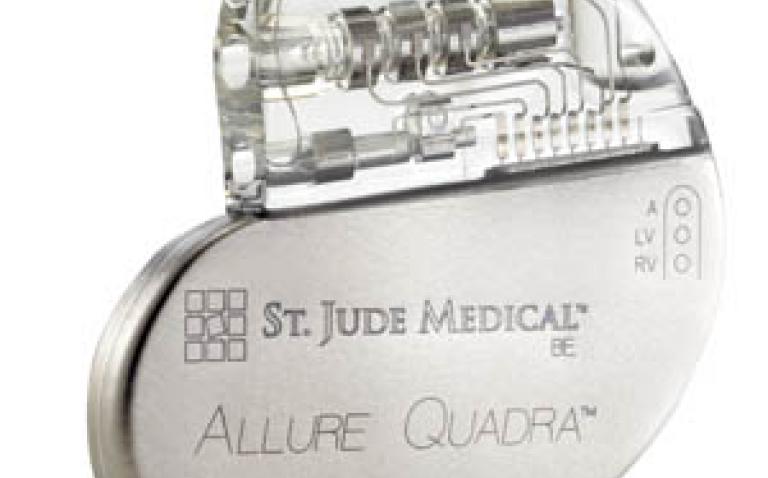St. Jude Medical, Inc has announced CE Mark approval and European launch of its Allure Quadra™ Cardiac Resynchronization Therapy Pacemaker (CRT-P).
The first-to-market quadripolar CRT-P system allows for increased implant efficiencies that result in fewer surgical revisions, and offers more pacing options to deliver higher success rates, as evidenced by robust clinical data. The Allure family of devices also offer enhanced heart failure (HF) diagnostics, including CorVue™ Impedance Monitoring, for improved patient management.
“Adding quadripolar technology to the CRT-P platform moves us forward in the treatment of heart failure and allows us to expand the proven clinical benefits to a new patient population,” said Dr. Amir Zaidi, consultant cardiologist and devices lead at Manchester Royal Infirmary, England. “The new features and additional pacing options allow for optimal lead placement and provide the patient greater opportunities to respond to therapy, while reducing the need for re-intervention.”
The new platform of St. Jude Medical low-voltage devices includes the only CE Mark approved algorithm for identifying stroke risk. The ASSERT, or ASymptomatic AF and Stroke Evaluation in Pacemaker Patients and the AF Reduction Atrial Pacing Trial, was designed to determine whether the detection of arrhythmias using pacemaker-based diagnostics predicts an increased risk of stroke in elderly, hypertensive patients without any history of atrial fibrillation (AF). Results found that pacemaker patients who have no history of atrial tachycardia (AT) or atrial fibrillation (AF), but have device-detected arrhythmias, are approximately 2.5 times more likely to have a stroke than patients who do not have device-detected arrhythmias.
“St. Jude Medical has seen benefits of efficiency and efficacy with its quadripolar CRT-D platform since its launch in 2010, and we expect the same results in the quadripolar CRT-P line,” said Eric S. Fain, MD, president of the Implantable Electronic Systems Division at St. Jude Medical. “While determining how to provide high-quality, affordable health care is major social challenge, we believe our quadripolar technology is a cost-effective solution that elevates the standard of care for heart failure patients in need of cardiac resynchronisation therapy.”
Approximately one in 10 patients who receive a bipolar CRT system has complications that could require additional surgery. St. Jude Medical’s quadripolar technology allows for additional pacing configurations that provide physicians with options not available on traditional bipolar systems. These additional options help manage common pacing complications without exposing the patient to additional surgeries for lead repositioning.
Additionally, the Allure CRT-P device improves HF management with timely access to vital diagnostic data including CorVue™ Impedance monitoring for earlier insight into HF progression, and Direct Trend™ Reports for a simplified look at all device data. The Allure Quadra CRT-P integrates the best-in-class quadripolar technology with multiple pacing configurations and TailoredTherapy™ features that enable physicians to address the dynamic challenges of HF by optimising the quadripolar system at implant and follow-up.
Currently, heart failure results in more than 3.6 million hospitalisations per year in Europe, and related costs represent approximately two percent of overall health care expenditures.










